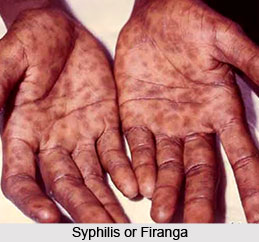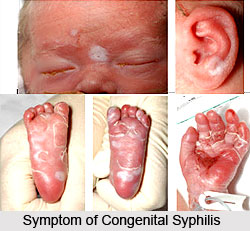 One of the most horrible venereal diseases, syphilis, is a contagious disease with a slow development. This is actually a sexually transmitted disease caused by bacteria. It infects the genital area, lips, mouth, or anus of both men and women.
One of the most horrible venereal diseases, syphilis, is a contagious disease with a slow development. This is actually a sexually transmitted disease caused by bacteria. It infects the genital area, lips, mouth, or anus of both men and women.
Syphilis is the highly infectious disease that can also be passed rarely through blood transfusions or from mother to fetus in the womb. Syphilis can cause irreversible damage to the brain, nerves, and body tissues without treatment.
Any sexually active person can be infected with syphilis, although there is a greater incidence among young people between the ages of 15 and 30 years. It is more prevalent in urban than rural areas. People often get the germs unknowingly.
Causes and Symptoms: Syphilis begins as a sore at the site of the infection, and in its tertiary stage, shows changes resembling those caused by leprosy and tuberculosis. The early stage of syphilis usually causes a single, small, painless sore. Sometimes it causes swelling in nearby lymph nodes. Syphilis usually causes a non-itchy skin rash, often on the hands and feet. Many people do not notice symptoms for years. The two main types of syphilis can be mentioned as acquired and inherited.
Acquired syphilis is caused by sexual intercourse with a person suffering from it. Sometimes by contact with the sores or even using the articles used by the patient such as utensils and clothes can spread the disease as well. The acquired form of the disease is commonly divided into three stages such as primary, secondary, and tertiary. Sometimes these stages merge into one another and the disease proceeds as one long sequence of the various symptoms, which appear as its severity increases. Sometimes the infection is so severe that ulcers appear all over the body. In other cases, it may appear only as a slight skin eruption but the effect on the constitution of the patient is no less harmful. The primary ulcers of syphilis are more like inflamed sores. At that stage, it is not very difficult to cure them if a proper diagnosis has been made. But the swelling subsides after some time and the inflamed lymphatic glands also show improvement. After a couple of months, however, the secondary symptoms start appearing in the form of a low fever, loss of appetite, vague pains throughout the body, and a faint red rash seen best upon the front of the chest. There may also be falling of hair, bloodlessness and sores in the mouth and the throat, headache, mental deterioration, and painful swelling on the bones of the body. There is also a general enlargement of the lymphatic-glands.
 The third or the tertiary stage develops after the lapse of a few months or even years, if the disease has remained untreated or inadequately treated. There is a growth of masses of granulated tissue all over the body. The patches of this growth known as `gummata` may appear as hard nodules on the skin, or form tumour like masses in the muscles. It can also cause great thickening of the bones, or they may develop in the brain or the spinal cord where their presence may show serious symptoms.
The third or the tertiary stage develops after the lapse of a few months or even years, if the disease has remained untreated or inadequately treated. There is a growth of masses of granulated tissue all over the body. The patches of this growth known as `gummata` may appear as hard nodules on the skin, or form tumour like masses in the muscles. It can also cause great thickening of the bones, or they may develop in the brain or the spinal cord where their presence may show serious symptoms.
Still later effects are apt to follow, such as a disease of the arteries, leading to aneurysm, in which the artery dilates due to the yielding of the vessel wall and gradual stretching by the pressure of the blood. Apoplexy or sudden paralysis can also happen; early mental failure can be the result. Locomotor ataxia i.e. the disordered movement of the limbs in walking or sometimes paralysis can also be seen.
Inherited syphilis or congenital syphilis may affect the child before its birth. As a rule, this may lead to a miscarriage or a dead birth. If the child is born alive, he may start showing secondary symptoms after a few weeks. He may be deformed or become deaf. If the symptoms are suppressed for a few years, the child may develop a sunken nose, broad at the bridge, and may suffer from inflammation of the cornea or the iris.
The eruptions of syphilis may appear as painful boils on the prepuce of males or labia majora of the vagina among females. The eruptions turn into hard nodules called chancre and then subside; giving rise to the above described other symptoms.
Medicines & Prescriptions: The following are the drugs of choice in the treatment of syphilis. Anyone or a combination of him or her may be taken.
Savirvari: 200 mg should be taken morning and evening with sweetened milk.
Sarivadyavaleha: 12 gm should be taken at breakfast time with milk.
Sarivadyasava. 20 mg should be taken with water after meals twice a day.
Rasachandradi Yoga: A 500 mg capsule should be taken thrice daily.
Hingulamrita Yoga: One teaspoonful to be taken thrice daily.
Diet and Other Regimen: A patient suffering from syphilis should be advised to take a salt-free diet as it helps in fast recovery. Bitter, sour, and pungent substances should be completely avoided. Intercourse is strictly forbidden in this type of infectious disease.




